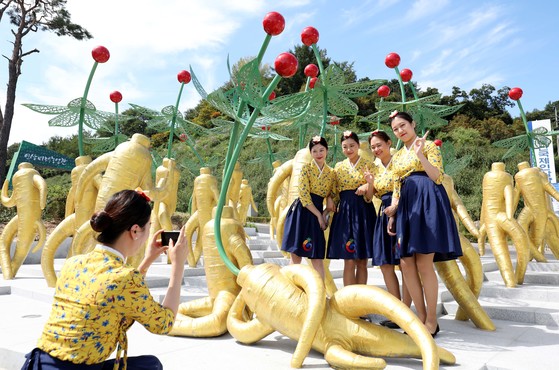
World Ginseng Expo held in Geumsan-eup, Geumsan-gun, Chungcheongnam-do. Reporter Kim Seong-tae
Korean researchers have confirmed that red ginseng inhibits lung cancer metastasis.
On the 26th, Dr. Jeong-yeop Ham’s team at the Korea Institute of Science and Technology (KIST) Natural Products Research Center and Dr. Hyun-Seok Ko’s team at Asan Medical Center in Seoul announced on the 26th that “it has been confirmed that ginsenosides contained in red ginseng effectively inhibit lung cancer metastasis. Ginsenoside, a compound word for ginseng and glycoside, refers to the glycoside compound contained in ginseng.
![Red ginseng manufactured by KIST through microwave processing. [사진 KIST]](https://i0.wp.com/pds.joins.com/news/component/htmlphoto_mmdata/202101/26/84e47fe0-e8da-4abc-9a6c-d49e22740541.jpg?w=560&ssl=1)
Red ginseng manufactured by KIST through microwave processing. [사진 KIST]
Cancer cells break away from the original tissue and migrate to other tissues to reproduce. In particular, metastasis of lung cancer occurs when a kind of signal substance (cytokine protein) (TGF-β1) in the body reproduces without dying even if it falls from the original tissue.
According to the National Statistical Office, the death toll of lung cancer per 100,000 people in Korea is 36.2, the number one cause of death for cancer patients. Various treatments such as targeted anti-cancer drugs and anti-cancer immunotherapy have appeared, but they are not showing much effect.
This time, the researchers amplified specific active ingredients (Rg3, Rk1, Rg5) of red ginseng more than 20 times. Red ginseng is heated or pressure is applied using a device that controls temperature and pressure (microwave) so that the active ingredients increase in an early time.
In order to develop pharmaceuticals using red ginseng, the physiological activity of a single ingredient derived from red ginseng must be scientifically proven. The researchers treated the major active ingredients of red ginseng (Rk1·Rg5) and lung cancer metastasis-inducing substance (TGF-β1) into lung cancer cells at the same time. Then, it was confirmed that Rk1·Rg5 inhibited the process of cancer metastasis induced by TGF-β1. KIST Dr. Ham Jeong-yeop explained, “Through this, we proved that the red ginseng component enhances the anticancer effect against lung cancer.”
![A journal containing a research paper by KIST that confirmed the inhibitory effect of red ginseng on lung cancer metastasis. [사진 KIST]](https://i0.wp.com/pds.joins.com/news/component/htmlphoto_mmdata/202101/26/fdd1bf4b-022e-44e8-aec7-5683d7fda46a.jpg?w=560&ssl=1)
A journal containing a research paper by KIST that confirmed the inhibitory effect of red ginseng on lung cancer metastasis. [사진 KIST]
Studies on the anticancer effect of red ginseng have been consistent. In 2018, a research team at Seoul National University Pharmacy University announced that certain ingredients (panaxinol) in ginseng and red ginseng have anticancer effects by blocking lung cancer cells and lung cancer stem cells.
This study differs in that red ginseng’s effectiveness has been proven to prevent cancer metastasis. Dr. Ham Jeong-yeop explained, “As it was revealed through this study that red ginseng inhibits metastasis by cancer, we presented a scientific basis for the development of natural anticancer drugs derived from red ginseng.”
Last year, KIST received a technology fee of 800 million won to Ponin Bio, a bio company, and handed over the related technology. Phoninbio is preparing to commercialize using this technology. The results of this study were published in the latest issue of the International Journal of Ginseng Research.
Reporter Moon Hee-cheol [email protected]
